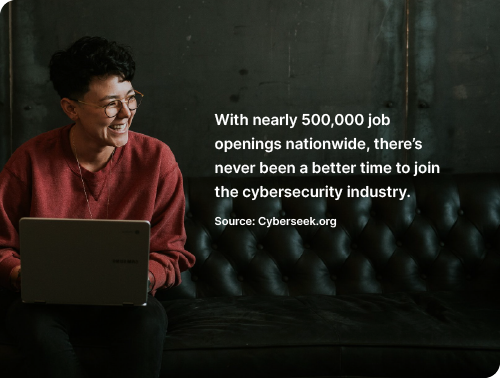NC State Cybersecurity Bootcamp
Accelerated Program | Comprehensive Training | Online Classroom


Transition to a Cybersecurity Career
Kickstart Your Professional Success
At the NC State Cybersecurity Bootcamp, you can launch your career in just eight months with hands-on training led by industry-active instructors. You'll gain practical experience through simulated, real-life cyberattacks and engage with a comprehensive curriculum. You’ll also have access to networking opportunities, professional guidance and ongoing career counseling. Our program integrates the latest AI advancements within cybersecurity topics to keep you ahead in the field.
This non-credit professional program is offered through NC State Continuing and Lifelong Education.
Fast-Track Your Career With a Comprehensive Bootcamp
Our eight-month bootcamp is designed to speed up your cybersecurity training and accelerate the development of the skills you need to kickstart a professional career in cybersecurity. The curriculum covers a broad range of topics, beginning with the basics and transitioning to advanced capabilities.

Gain Hands-On Experience in Cybersecurity
Hands-On Classes
Build job-ready skills to succeed as a cybersecurity professional. Our fully remote program offers real-world knowledge through interactive virtual classes and simulated exercises.
Expert Instructors
Benefit from the mentorship and industry expertise of seasoned cybersecurity professionals.
TDX Arena
Advance your skills in TDX Arena, our immersive training platform. You'll practice handling real-life cyberattacks and gain a competitive edge.
Virtual Classroom
Access recordings, communication tools and a collaborative online community. The curriculum is regularly updated to include the latest cyber advancements, AI tools and practices.
Enjoy Personalized Support
Learner Support
Our team provides the resources you need to ace your classes and thrive in the cybersecurity workforce. They keep you accountable, and facilitate tutoring sessions and exam retests, offering constant guidance.
Career Coaching
You will have access to professional career coaches who can help you define and achieve your goals. From technical interview practice to polishing your LinkedIn profile and resume, they are ready to give you the edge you need to succeed.
Professional Network
Attend live virtual events with career fairs, industry panels, mock interview days, skill-building webinars and more.
Job Search Assistance
Locating the job opportunities that align with your specific career goals is not always easy. Our team can assist you in finding the best opportunities for you, and even make crucial introductions to secure your first cybersecurity role.

Discover Our Courses
Dive into the bootcamp catalog.
Program Overview
32-Week Cybersecurity Bootcamp
- Fundamentals Phase12 Weeks
The Fundamentals Phase covers essential cybersecurity principles, including network basics and their functions, Microsoft’s infrastructure and Linux operating system management. You’ll leave this phase with a solid foundation to help you advance in the world of cybersecurity.
- Computer Networking Fundamentals
This course offers a comprehensive introduction to computer networking, providing practical experience in configuring and managing network devices for optimal performance and security. Learners will gain an understanding of network architectures, protocols and security while honing their device configuration and troubleshooting skills. Through hands-on activities, they will apply critical thinking and problem-solving skills to address common networking challenges.
Learners will:
- Learn how different entities connect and interact across digital landscapes.
- Gain an understanding of the various types of networks and their impact on our interconnected world.
- Harness the power of configuration settings documentation.
- Be exposed to the role of audits in ensuring optimal network performance and security.
- Find out why system and communications protection plays a pivotal role in safeguarding information.
- Learn how to effectively update and adapt policies to keep pace with the ever-evolving landscape.
Information covered in this course helps prepare learners to begin studying for the following certifications:* CompTIA® Network+, ISC2 Certified in Cybersecurity℠
- Microsoft Security Systems Administration
This course offers hands-on training focused on securing Microsoft Windows environments, providing learners with the practical knowledge and skills needed to implement security features and tools, including Microsoft Defender, BitLocker and Windows Firewall. They will also be able to configure and manage networks to ensure security and stability using system admin tools. By the end of the course, participants will understand the basics of Microsoft infrastructure and be able to implement and maintain secure Windows environments in various professional roles.
Learners will:
- Gain an understanding of Microsoft infrastructure and its components.
- Learn effective strategies to protect Microsoft’s infrastructure from potential threats.
- Develop skills to manage various types of accounts based on business function.
- Explore ways to maintain a secure and safe network environment.
- Discover how automations and scripting can enhance both security and efficiency in cybersecurity roles.
- Understand how Active Directory helps manage permissions and control access to network resources.
- Learn how to improve system security and operational efficiencies with Powershell.
- Integrating Your Infrastructure Security
This course equips learners with the necessary skills to manage Linux operating systems, utilize basic Python programming, explore cloud computing and enhance system security against threats and vulnerabilities. Additionally, they will learn how to monitor, scan and analyze threats and vulnerabilities in these environments, while also becoming familiar with remediation techniques. Finally, learners will begin to understand how DevSecOps impacts the cybersecurity landscape.
Learners will:
- Gain an understanding of how to manage Linux operating systems, as well as how to monitor, scan, and analyze threats and vulnerabilities in Linux and cloud-based environments.
- Be introduced to Python programming.
- Develop a basic understanding of cloud computing environments and create an instance using Amazon Web Services (AWS).
- Understand how to remediate and share details to protect other systems.
- Learn how to create automations to efficiently manage and protect systems.
- Explore the design principles of scalable cloud solutions and the integration of different environments.
- Become familiar with DevSecOps.
Information covered in this course helps prepare learners to begin studying for the following certification:* AWS Cloud Practitioner
- Infrastructure Phase12 Weeks
The Infrastructure Phase provides you with the knowledge and hands-on experience to create and sustain secure infrastructures and technologies. You’ll gain practical skills in applying critical security measures, as well as an understanding of a hacker’s perspective, to safeguard organizational systems.
- Securing Your Network
In this course, you continue building on your knowledge of networks to deepen that understanding. As you explore networks, you will familiarize yourself with the different components of wired and wireless networks including their security constraints and vulnerabilities. You will then continue to develop access controls to ensure that you have considered what it means to secure a network from people and data to devices. In addition, you will look at how to safely build and secure networks including discussions around cryptography and privacy constraints.
Learners will:
- Develop an understanding of network security measures, including strategies needed to keep networks safe.
- Begin to master network monitoring techniques.
- Gain an understanding of how to manage accounts within a system effectively.
- See how security attributes can help strengthen network defenses.
- Become familiar with a range of common tools and technologies that support network safety.
- Acquire the skills to build a secure network architecture.
- Learn the basics of MHN networks and how to set them up effectively.
- Understand the relationship between Telnet and POP3 machines.
Information covered in this course helps prepare learners to begin studying for the following certifications:* CompTIA® Network+, Cisco Certified CyberOps Associate
- Designing Your Cybersecurity Infrastructure
This course delves into the essential aspects of safeguarding endpoint devices, implementing data loss prevention techniques and utilizing advanced tools and strategies to protect an organization’s digital assets. By the end of the course, participants will have a comprehensive understanding of endpoint device protection, data loss prevention and security considerations for industrial systems and IoT devices.
Learners will:
- Explore endpoint devices to gain an understanding of how to evaluate, identify threats to and protect them.
- Learn to document and track configurations and tool options.
- Understand how to establish rules and restrictions that safeguard endpoint devices from potential harm.
- Discover how to work with external information systems while maintaining the security of endpoint devices.
- Develop the skills to implement data loss prevention techniques.
- Become familiar with the threats and security measures related to Industrial Control Systems (ICS) and Industrial Internet of Things (IIOT).
Information covered in this course helps prepare learners to begin studying for the following certifications:* CompTIA® Security+, CompTIA® CySA+, ISC2 CISSP
- Social Engineering and Ethical Hacking
In the Social Engineering and Ethical Hacking course, participants explore the inner workings of hackers’ minds and acquire an understanding of game theory principles as they relate to cybersecurity defense and solutions. By the end of the course, learners will have an understanding of social engineering techniques and ethical hacking principles, empowering them to enhance cybersecurity defenses and protect against potential threats.
Learners will:
- Gain insights into the motivations of potential attackers and their actions.
- Develop an understanding of how to use a malicious hacker’s “state of mind” to enhance system protection.
- Discover how ethical hacking can proactively support applications, systems and organizational infrastructure.
- Explore how reconnaissance, penetration testing and defense system bypassing can help keep systems safe.
- Learn how to identify vulnerabilities in web applications and cloud-based systems
- Build skills to effectively report risks and provide defense recommendations.
- Understand how social engineering techniques can be used to deceive individuals.
Information covered in this course helps prepare learners to begin studying for the following certifications:* CompTIA® CySA+, PenTest+
- Advanced Phase8 Weeks
The Advanced Phase equips you with the knowledge and tools to respond to attacks and secure systems against future threats using digital forensics and post-attack response tools.
Upon successful completion of this phase, you will receive your Cybersecurity Bootcamp Certificate of Completion.
- Digital Forensics and Incident Response
This course equips learners with essential tools to effectively respond to attacks, conduct investigations, gather evidence and produce comprehensive reports. By the end of the course, participants will have the necessary knowledge to respond to incidents, run investigations and report their findings. These skills will help students to recognize, analyze and ideate about security incidents to prevent future breaches.
Learners will:
- Be immersed in the fundamentals of offensive security.
- Gain an understanding of the basics of digital forensics.
- Explore file and stolen data recovery strategies.
- Learn how to effectively handle various types of attacks targeting organizations.
- Get insight into the strategies attackers use to attain access to critical systems and data.
- Explore the basics of malware analysis to enhance your ability to detect and neutralize potential threats.
Information covered in this course helps prepare learners to begin studying for the following certifications:* CompTIA® Security+, CompTIA® CySA+, and ISC2 SSCP
- Threat Hunting and Intelligence
The Threat Hunting and Intelligence course provides learners with the knowledge to identify and mitigate vulnerabilities in an organization’s infrastructure. By the end of the course, learners will be equipped with the expertise to identify vulnerabilities, respond to threats and develop robust plans to safeguard an organization’s infrastructure.
Learners will:
- Develop a comprehensive understanding of the threats and vulnerabilities that can arise within an organization’s network infrastructure, encompassing hardware devices, software applications and network services.
- Enhance their ability to proactively identify and respond to threats, fostering a proactive security approach.
- Acquire the knowledge and skills to develop effective plans and procedures to handle security situations efficiently, ensuring a swift and coordinated response.
- Cultivate the ability to evaluate information sources and tools, enabling them to strengthen their defense strategies.
Information covered in this course helps prepare learners to begin studying for the following certifications:* CompTIA® Security+, CompTIA® CySA+, ISC2 SSCP, ISC2 CISSP
*For more information, please visit https://thrivedx.com/cybersecurity-program-disclaimers.
Knowledge You Can Apply to Certification Exams
If you are new to the cybersecurity industry, obtaining industry-recognized certifications* can help boost your credentials and give you a competitive advantage over other candidates. Our courses cover concepts to help you gain foundational knowledge of the following certifications you may wish to pursue following completion of the Cybersecurity Bootcamp.
AWS Certified Cloud Practitioner
The AWS Certified Cloud Practitioner certification exam is meant for individuals with knowledge of the widespread AWS Cloud platform, as well as its infrastructure and systems. Security and compliance experience in AWS Cloud is a key requirement for passing the exam.
The Cybersecurity Bootcamp includes complimentary access to the AWS Academy curriculum and a discounted voucher for the AWS Certification exam.* Program materials help provide a real-world understanding of AWS Cloud practices so learners can pursue AWS Cloud Certification to work in entry-level roles.
*For more information, please visit https://thrivedx.com/cybersecurity-program-disclaimers.
CertNexus® CyberSec First Responder® (CFR)
The Cybersecurity Bootcamp provides learners with the essential knowledge to start preparing for the CertNexus® CyberSec First Responder® (CFR) certification. A 20% discount for CertNexus® certifications and prep material is available to learners upon completion of the program.*
*For more information, please visit https://thrivedx.com/cybersecurity-program-disclaimers.
Cisco Certified CyberOps Associate
The Cisco Certified CyberOps Associate certification allows learners to gain an understanding of how Security Operations Centre (SOC) teams detect and respond to security incidents and is considered a great starting point for cybersecurity professionals.
CompTIA® CySA+
Designed to provide a higher focus at an intermediate level on applying behavioral analytics to networks than the CompTIA® Security+ exam, this exam will cover core cybersecurity skills while placing a greater significance on software and application security. Additionally, it will cover automation, threat hunting and IT compliance within the industry.
CompTIA® Network+
The CompTIA® Network+ certification exam measures a learner’s ability and knowledge of network device configuration, management and troubleshooting. It also tests a cybersecurity professional’s familiarity with emerging mobile, cloud, communication and virtualization technologies.
CompTIA® Network+
The CompTIA® Security+ certification is a globally recognized credential that validates foundational skills in cybersecurity, including threat management, risk assessment and network security. It’s ideal for entry-level security professionals and is often a key stepping stone for careers in information security and IT.
GIAC Certified Incident Handler
The GIAC Incident Handler certification validates a practitioner’s ability to detect, respond and resolve computer security incidents using a wide range of essential security skills. GCIH certification holders have the knowledge needed to manage security incidents by understanding common attack techniques, vectors and tools, as well as defend against and respond to such attacks when they occur.
GIAC Security Essentials
The GIAC Security Essentials (GSEC) certification validates a practitioner’s knowledge of information security beyond simple terminology and concepts. GSEC certification holders are demonstrating that they are qualified for hands-on IT systems roles with respect to security tasks.
ISC2 SSCP – Systems Security Certified Practitioner
Learners with at least one year of experience after the completion of their program can take the ISC2 SSCP – Systems Security Certified Practitioner certification exam.*
The ISC2 SSCP exam is meant for cybersecurity professionals who have proven, practical and hands-on experience and knowledge of the security environment. Once they obtain this certification, individuals have proof that they can carry out the implementation, monitoring, and administration of information technology infrastructure according to information security best practices, policies and procedures.
*Requires a minimum of one year of cumulative work experience in one or more of the seven domains of the SSCP Common Body of Knowledge (CBK) in order to be certified.
LPI Linux Essentials
The LPI Linux Essentials exam offers learners a way to verify their knowledge of the Linux operating system, as well as the workings of various open-source applications. The exam tests the ability to manage users and groups on Linux and also measures their competency with the Linux command line, system permissions and security, basic network configuration skills and overall Linux administration.
Certified Information Security Manager
Data breaches, ransomware attacks and other constantly evolving security threats are top-of-mind for today’s IT professionals. With a Certified Information Security Manager® (CISM®) certification, you’ll learn how to assess risks, implement effective governance and proactively respond to incidents.
- AWS Certified Cloud Practitioner
The AWS Certified Cloud Practitioner certification exam is meant for individuals with knowledge of the widespread AWS Cloud platform, as well as its infrastructure and systems. Security and compliance experience in AWS Cloud is a key requirement for passing the exam.
The Cybersecurity Bootcamp includes complimentary access to the AWS Academy curriculum and a discounted voucher for the AWS Certification exam.* Program materials help provide a real-world understanding of AWS Cloud practices so learners can pursue AWS Cloud Certification to work in entry-level roles.
*For more information, please visit https://thrivedx.com/cybersecurity-program-disclaimers.
- CertNexus® CyberSec First Responder® (CFR)
The Cybersecurity Bootcamp provides learners with the essential knowledge to start preparing for the CertNexus® CyberSec First Responder® (CFR) certification. A 20% discount for CertNexus® certifications and prep material is available to learners upon completion of the program.*
*For more information, please visit https://thrivedx.com/cybersecurity-program-disclaimers.
- Cisco Certified CyberOps Associate
The Cisco Certified CyberOps Associate certification allows learners to gain an understanding of how Security Operations Centre (SOC) teams detect and respond to security incidents and is considered a great starting point for cybersecurity professionals.
- CompTIA® CySA+
Designed to provide a higher focus at an intermediate level on applying behavioral analytics to networks than the CompTIA® Security+ exam, this exam will cover core cybersecurity skills while placing a greater significance on software and application security. Additionally, it will cover automation, threat hunting and IT compliance within the industry.
- CompTIA® Network+
The CompTIA® Network+ certification exam measures a learner’s ability and knowledge of network device configuration, management and troubleshooting. It also tests a cybersecurity professional’s familiarity with emerging mobile, cloud, communication and virtualization technologies.
- CompTIA® Security+
The CompTIA® Security+ certification is a globally recognized credential that validates foundational skills in cybersecurity, including threat management, risk assessment, and network security. It’s ideal for entry-level security professionals and is often a key stepping stone for careers in information security and IT.
- GIAC Certified Incident Handler
The GIAC Incident Handler certification validates a practitioner’s ability to detect, respond and resolve computer security incidents using a wide range of essential security skills. GCIH certification holders have the knowledge needed to manage security incidents by understanding common attack techniques, vectors and tools, as well as defend against and respond to such attacks when they occur.
- GIAC Security Essentials
The GIAC Security Essentials (GSEC) certification validates a practitioner’s knowledge of information security beyond simple terminology and concepts. GSEC certification holders are demonstrating that they are qualified for hands-on IT systems roles with respect to security tasks.
- ISC2 SSCP – Systems Security Certified Practitioner
Learners with at least one year of experience after the completion of their program can take the ISC2 SSCP – Systems Security Certified Practitioner certification exam.*
The ISC2 SSCP exam is meant for cybersecurity professionals who have proven, practical and hands-on experience and knowledge of the security environment. Once they obtain this certification, individuals have proof that they can carry out the implementation, monitoring, and administration of information technology infrastructure according to information security best practices, policies and procedures.
*Requires a minimum of one year of cumulative work experience in one or more of the seven domains of the SSCP Common Body of Knowledge (CBK) in order to be certified.
- LPI Linux Essentials
The LPI Linux Essentials exam offers learners a way to verify their knowledge of the Linux operating system, as well as the workings of various open-source applications. The exam tests the ability to manage users and groups on Linux and also measures their competency with the Linux command line, system permissions and security, basic network configuration skills and overall Linux administration.
- Certified Information Security Manager
Data breaches, ransomware attacks and other constantly evolving security threats are top-of-mind for today’s IT professionals. With a Certified Information Security Manager® (CISM®) certification, you’ll learn how to assess risks, implement effective governance and proactively respond to incidents.

Program Tuition
Invest in yourself and your future career. Our comprehensive bootcamp can help you develop the job-ready skills you need to be successful in cybersecurity.
$18,900*
- 32-Week Cybersecurity Bootcamp
Requirements
- Internet access
-$50 registration fee*
*Tuition, fees, and deposits are subject to change. Registration fee is non-refundable.








